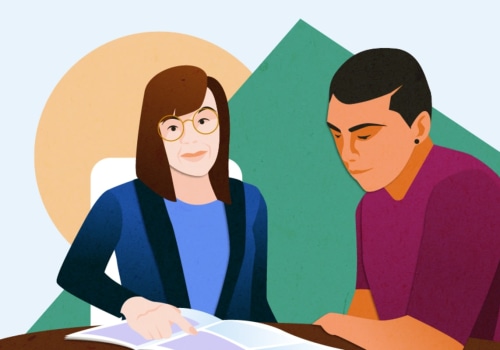In today's fast-paced world, education is constantly evolving and students are expected to keep up with the ever-changing demands of their academic curriculum. This can be challenging for many students, especially when it comes to hands-on learning. Hands-on learning is a popular method of teaching that involves actively engaging students in a practical and interactive way. It allows students to learn by doing, rather than just reading or listening.
In the United Kingdom, private tutoring has become an increasingly popular option for students looking to improve their academic performance. In this article, we will take a comprehensive look at hands-on learning for private tutoring in the UK, specifically focusing on the types of private tutoring available (online vs. in-person) and the benefits of in-person tutoring. Whether you are a student looking for additional support or a parent considering private tutoring for your child, this article will provide valuable insights and information on how hands-on learning can enhance the learning experience. Hands-on learning refers to a teaching method that involves direct participation and interaction from the student.
This type of learning is often considered more effective than traditional classroom learning as it allows students to actively engage with the material and apply it in practical ways. In the context of private tutoring, hands-on learning can provide personalized, one-on-one help in specific subjects. For example, a student struggling with math may benefit from hands-on activities such as using manipulatives or real-life problem-solving scenarios. These hands-on activities can help the student understand difficult concepts by allowing them to physically manipulate objects and see how they relate to mathematical equations. This type of learning is especially beneficial for students who may struggle with abstract concepts and need a more concrete understanding. In addition to helping students better understand difficult topics, hands-on learning can also improve their problem-solving skills.
By engaging in hands-on activities, students are forced to think critically and find solutions on their own. This can lead to a deeper understanding of the subject matter and an increase in confidence when tackling similar problems in the future. Private tutors can incorporate hands-on learning into their lessons by providing students with interactive materials and activities. For subjects like science and technology, hands-on experiments and projects can be used to reinforce theoretical concepts learned in class. This type of personalized learning can help students stay engaged and motivated, leading to better academic outcomes. In today's fast-paced world, where competition in academia is constantly increasing, hands-on learning can give students an edge in their studies.
By providing them with a more interactive and personalized learning experience, private tutoring through hands-on methods can help students achieve their academic goals and succeed in their future endeavors.
The Benefits of Hands-on Learning
Hands-on learning has numerous benefits for students seeking private tutoring in the UK. With traditional classroom learning, students may struggle to fully grasp concepts and apply them in real-life scenarios. However, with hands-on learning, students are able to actively engage with the material and gain a deeper understanding through practical application. One of the main benefits of hands-on learning is increased retention and understanding.When students are able to physically interact with the material, it becomes more tangible and easier to remember. This is especially beneficial for students who may struggle with traditional teaching methods or have learning disabilities. Additionally, hands-on learning allows for immediate feedback and correction. In a one-on-one private tutoring setting, tutors can observe and correct any mistakes or misunderstandings in real-time.
This helps students improve their skills and build confidence in their abilities. Another advantage of hands-on learning is the development of critical thinking and problem-solving skills. By actively engaging in activities and experiments, students are able to think critically and come up with solutions on their own. This not only helps them in academic settings but also prepares them for real-world challenges.
Improved Understanding and Retention
One of the main advantages of hands-on learning in private tutoring is its ability to improve understanding and retention of information.Research has shown that students retain more knowledge when they are actively engaged in the learning process and are able to apply what they have learned in a practical setting. Hands-on learning allows students to physically interact with the material, making it more tangible and easier to understand. This type of learning also encourages critical thinking skills as students are required to problem-solve and think creatively in order to complete hands-on activities. In addition, the repetitive nature of hands-on learning can help with retention.
By actively engaging in the material and practicing it multiple times, students are more likely to remember the information long-term. Furthermore, hands-on learning can be tailored to each individual student's needs and learning style, making it a more effective method of teaching. Tutors can create hands-on activities that cater to a student's specific strengths and weaknesses, helping them better grasp difficult concepts and improve their understanding. Overall, studies have consistently shown that hands-on learning can lead to better understanding and retention of information, making it a valuable tool in private tutoring for students looking to excel academically.
Preparation for Exams
Hands-on learning can be particularly beneficial for exam preparation as it allows students to apply their knowledge in a practical way.This type of learning involves actively engaging in the material, rather than just passively consuming it through lectures or textbooks. For private tutoring in the UK, hands-on learning can be especially effective in preparing students for exams. It allows them to practice and apply the concepts they have learned, which can help improve their understanding and retention of the material. Additionally, hands-on learning can also help students develop critical thinking and problem-solving skills, which are essential for success in exams. By actively working through problems and scenarios, students can learn how to approach different types of questions and think critically about the subject matter. Moreover, hands-on learning can help alleviate exam anxiety by providing students with a sense of control and confidence in their abilities. Through practical application of their knowledge, they can gain a better understanding of their strengths and weaknesses, and therefore feel more prepared and confident going into exams. In conclusion, when it comes to exam preparation, hands-on learning is a valuable tool that can enhance students' understanding, critical thinking skills, and confidence.
Private tutoring in the UK that incorporates hands-on learning can provide students with a well-rounded approach to exam preparation and help them achieve their academic goals.
Personalized Learning Experience
When it comes to private tutoring, a one-size-fits-all approach may not always be the most effective. This is where hands-on learning can make a significant difference. Unlike traditional classroom settings, hands-on learning allows for a personalized approach to teaching and learning. Students are able to receive individualized attention and guidance from their tutors, tailored to their specific learning needs and styles. Through hands-on learning, tutors are able to identify and address any gaps in a student's understanding, as well as provide additional support in areas that they may struggle with.This personalized learning experience not only helps students better understand the subject matter, but also boosts their confidence and motivation. In addition, hands-on learning allows for a more interactive and engaging experience for students. It encourages them to actively participate in their own learning and take ownership of their academic journey. This can lead to better retention of information and a deeper understanding of the subject. Furthermore, personalized learning through hands-on activities can cater to different learning styles, whether it be visual, auditory, or kinesthetic. This ensures that students are able to learn in a way that works best for them. In conclusion, hands-on learning offers a personalized and effective approach to private tutoring in the UK.
With its ability to address individual needs and engage students in their own learning, it is a valuable tool for achieving academic success. Overall, hands-on learning offers a unique and effective approach to private tutoring in the UK. By incorporating hands-on activities and personalized learning, students can improve their understanding, retention, and preparation for exams. Whether it's online or in-person, hands-on learning can provide the necessary academic support for students to reach their full potential.






